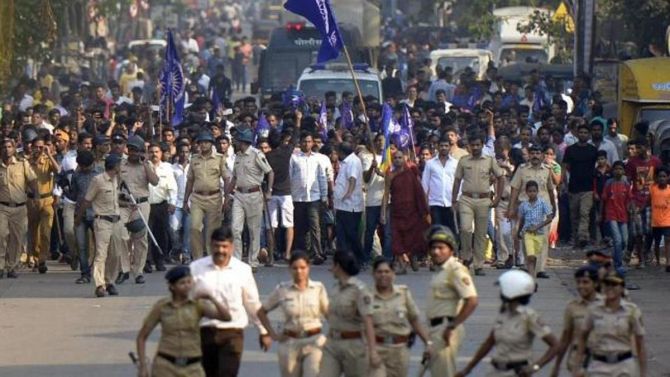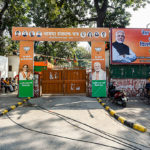If the Bhima Koregaon commission is terminated before completing its work, the people affected by the violence ‘would feel cheated’.
Jyoti Punwani reports.
IMAGE: Thousands of Dalits at Bhima Koregaon in Maharashtra, January 1, 2019. Photograph: PTI Photo
First, the commission declared its intention to stop its proceedings.
Now, the government seems keen to do so.
Is the Maharashtra government at all serious about the Bhima Koregaon Commission of Inquiry?
The government’s notification dated February 11, announcing that it is granting a final extension of two months to the commission, has surprised those involved with it.
With only 25 witnesses examined, there is no way the commission’s work can be completed within two months.
“In our status report sent to the government last month, we had informed them that we will need a minimum of six months more to complete our work,” says advocate Ashish Satpute, counsel for the commission. “Crucial witnesses from the villages where the violence took place are still to be examined. Also, the then SP, the then collector, and the then commissioner of police, Pune, need to be called.”
IMAGE: Advocate Ashish Satpute, counsel for the commission, Sumit Mullick, member, commission, Shishir Hiray, Maharashtra government counsel, Justice J N Patel, chairman of the commission. Photograph: Jyoti Punwani
The two-member commission of inquiry, headed by retired chief justice of the Calcutta high court J N Patel, is investigating the violence that took place on January 1, 2018, at Bhima Koregaon near Pune, where lakhs of Dalits had gathered to observe the 200th anniversary of the battle between the British and the Peshwas. The British won with the help of Mahar soldiers.
The anniversary is commemorated every year by Dalits after Dr B R Ambedkar visited the spot in 1929.
The violence on January 1, 2018 claimed one life and enormous loss of property. 48 people were injured.
It was followed by a state-wide bandh called by Prakash Ambedkar and other Dalit groups which also saw incidents of violence.
Then chief minister Devendra Fadnavis had set up the commission on February 9, 2018, but thanks to bureaucratic delays, hearings only began on September 5, 2018. Since then, it has been granted four extensions of varying lengths.
KhabriBaba.com obtained a copy of the status report sent by the commission to the government on January 10, 2020.
The report points out that the last extension, given on November 8, 2019, was for only three months, though the commission had pointed out in its previous status report that the number of witnesses yet to be examined might be more than 50.
Since then, examination of only three witnesses could be completed, though 11 were summoned. While two declined, the rest sought adjournments for various reasons.
Commission sources said even if only crucial witnesses were chosen out of the remaining 50, these would number at least eight to ten.
Advocate Kiran Channe, who represents the Dalit victims, put the number at much more. “Apart from the villagers of Vadhu Budruk, we need the testimony of the Gaekwad family, and politicians such as Sharad Pawar.”
The Gaekwad family are the descendants of Govind Gopal Gaekwad, who is said to have conducted the last rites of Chhatrapati Shivaji Maharaj’s son Sambhaji Maharaj in 1689 in defiance of emperor Aurangzeb’s diktat.
This version of history is contested by Hindutva elements.
Clashes near Govind Gopal Gaekwad’s samadhi formed the backdrop of the violence on January 1, 2018. Those clashes have been a recurrent theme in the hearings as have the different historical versions connected with who conducted Sambhaji Maharaj’s last rites.
The status report says that so far the commission has examined witnesses on the history of the Govind Gopal samadhi, the Sambhaji Maharaj samadhi, the battle of Bhima Koregaon and the history of the Jai Stambh or victory memorial erected there.
In conclusion, the status report states: ‘Examination of important victims is nearing completion. Examination of witnesses for the state administration has commenced. Thus, hearings are at a very crucial stage. Commission also intends to examine some political leaders to have their views on the terms of reference. Total number of witnesses may be around 50 which will take not less than six months.’
Congressman Sanjay Lakhe Patil, who is a party before the commission, expressed the apprehension that if the commission was terminated before being able to complete its work, the people affected by the violence of January 1, 2018, “would feel cheated. That would not be good for the social health of the state.”
“It would look like this government is trying to protect Sambhaji Bhide and Milind Ekbote. One can understand the BJP government doing so, but why should our government do this?” Lakhe Patil asks.
Bhide and Ekbote, both Hindutva leaders, were the first to be named by the police as responsible for the violence. They have contested the version that the last rites of Sambhaji Maharaj were performed by Govind Gopal Gaekwad.
IMAGE: The Bhima-Koregaon commission in session. Photograph: Jyoti Punwani
Dalit witnesses have told the commission that stones were hurled at their vehicles on January 1, 2018 by mobs carrying saffron flags. The same was stated by then CM Fadnavis in the Maharashtra assembly on March 13, 2018.
“The commission was set up to find out the real perpetrators of the violence,” adds Lakhe Patil. “If it doesn’t do so, its basic purpose would have been lost. It is in the interests of democracy that it must.”
It becomes even more necessary now, he stresses, that the commission grant his request to summon then CM Fadnavis as a witness. “He knew everything about the goings-on then.”
Lakhe Patil says he would request the government to give the commission a six-month extension. So would all Ambedkarite groups, adds advocate Channe.
However, Lakhe Patil hopes the commission would sit everyday, unlike its current practice of sitting for three-four consecutive days alternately in Mumbai and Pune every month.
The commission has had to curtail its sittings firstly because the second member, Sumit Mullick, is also Maharashtra’s chief information commissioner. In fact, in Mumbai, it is from his office that the commission functions.
The Mumbai hearings, therefore, are held only in the afternoon.
Justice J N Patel is also involved in arbitration matters.
IMAGE: Advocate Kiran Channe, left, represents Dalit victims before the commission. Photograph: Jyoti Punwani
At its last hearing on January 30 in Mumbai, Justice Patel had announced that the commission has decided to wind up, because of the state government’s attitude.
A letter to the state home department dated January 30, 2020, signed by Commission Secretary V V Palnitkar, headlined ‘Recommendation to wind up Koregaon Bhima Commission of Inquiry for want of funds’, described how honorariums and salaries of its staff, from the commission itself, to commission counsel to commission superintendent to the peons, had not been paid since November. Nor had miscellaneous expenses been paid.
The letter stated that in November 2019, the commission had requested Rs 65 lakhs (Rs 6.5 million) be released to cover all the expenses.
However, after the letter was sent, the government released just Rs 20 lakh (Rs 2 million), enough to pay pending and future salaries, but not enough to cover miscellaneous expenses.
Meanwhile, even before the commission could begin its hearings, the then Fadnavis government arrested nine Left intellectuals for the violence at Bhima Koregaon, linking them to the speeches made at the Elgar Parishad held in Pune on December 31, 2017.
The Parishad was called by retired justices B G Kolse Patil and P B Sawant as a rallying event against the BJP government. Many Leftists and Ambedkarites addressed the gathering, describing the BJP government as ‘New Peshwa rule’.
Ever since Maharashtra’s coalition government took over in November, Nationalist Congress Party President Sharad Pawar has asked that the cases against these individuals be reconsidered. Just when the state government was to set up an SIT to do so, the Centre asked the National Investigation Agency to take over the case.
It appears then that neither the previous BJP-Sena government nor the current Shiv Sena-NCP-Congress government sees much use in the Commission.




